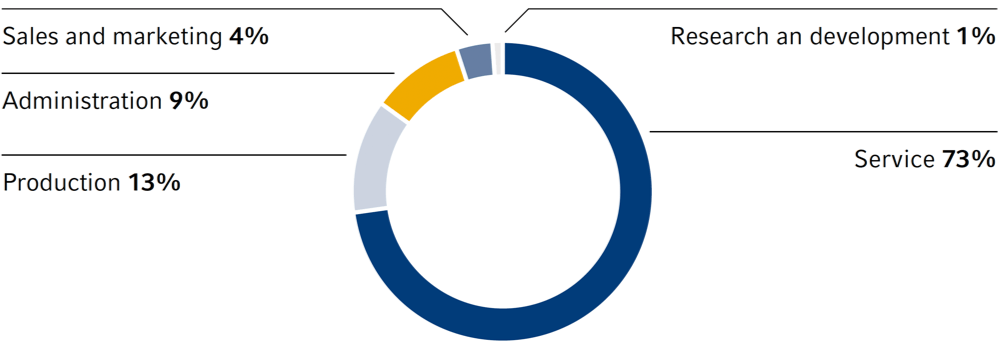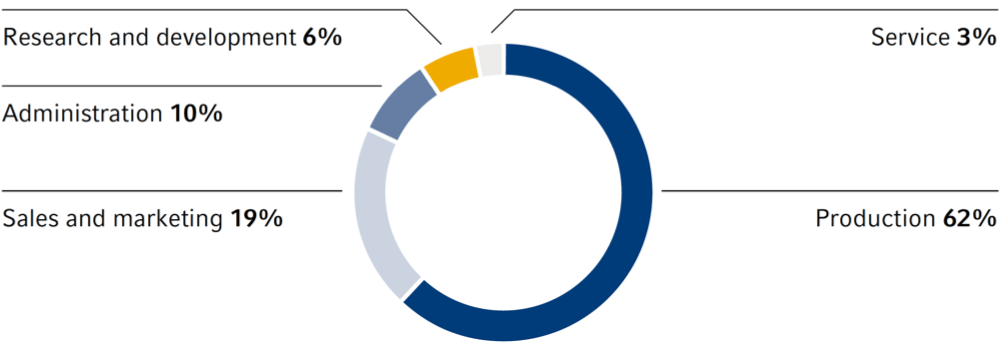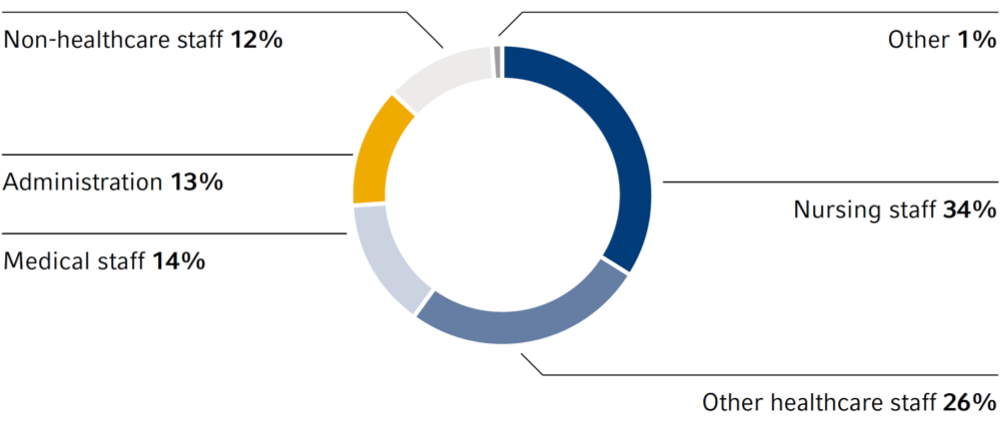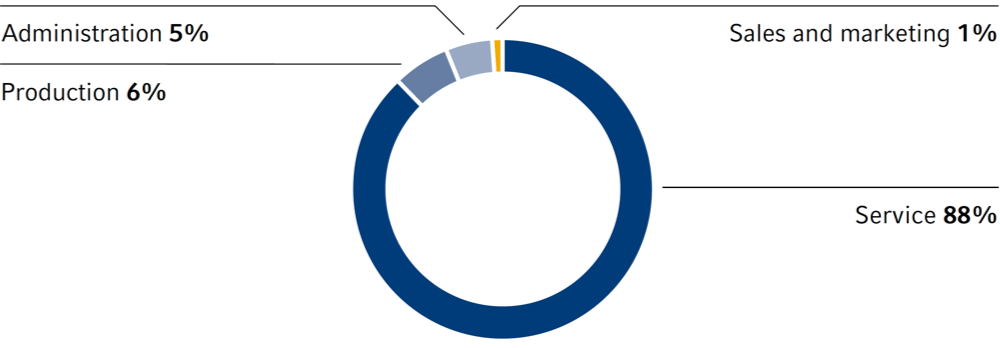The commitment of our more than 300,000 employees worldwide forms the basis of our success. Their achievements, skills, and dedication help our business segments to hold leading positions in their respective markets.
We set out the organization and responsibilities relating to employees in the approach below. There, we also address the guidelines and regulations that must be followed.
We have identified the following topics as material for the Fresenius Group, on which we report on the following pages:
- Working conditions
- Recruitment
- Employee retention
- Dialog and feedback formats
- Employee development
- Employee participation
In addition, we present Our ambitions, Progress and measures in 2022, and Evaluation for the reporting year.
Furthermore, we report separately on the key topics of Occupational health and safety and Diversity and equal opportunities. Occupational health and safety affects both employees and patients in our healthcare facilities. Diversity and equal opportunities have been identified as material to our company, and demonstrate its relevance in our Human Rights Statement and in the Human rights chapter. We present our approach in the Diversity and equal opportunity chapter.
Our approach
We want to continue attracting, retaining, and integrating talent at Fresenius. To this end, we need to consolidate and build on our position as an attractive employer in a market environment characterized by a shortage of personnel Employee-friendly working conditions, attractive benefits, and a dialog-oriented corporate culture all help us to achieve this.
Organization and responsibilities
The Management Board member of the Fresenius Group responsible for Human Resources (Labor Relations Director), Risk Management and Legal assumes responsibility for steering strategic Group-wide projects, e. g. the global employee survey. Within the Fresenius Group Management Board, the Chief Executive Officers (CEOs) of the business segments are responsible for the operating tasks of their business segment. The management boards of the business segments define the management approaches and regulate responsibility for human resources (HR) topics, e. g., via a business allocation plan. In the Fresenius Group HR Steering Committee, the HR managers or responsible functions of the business segments and of the Group function Corporate HR Management exchange information on a monthly basis. The Group Management Board member responsible for Human Resources (Labor Relations Director), Risk Management and Legal, participates in the meetings. As part of risk reporting, the Management Board of the Fresenius Group is informed quarterly about the effectiveness of measures in the area of HR, i. e., about risks or incidents that could have a material adverse effect on the operating business, reputation, or the value chain of the Group and its business segments. In 2022, for example, this related to the shortage of personnel in the healthcare sector. The Audit Committee of the Supervisory Board is informed about these developments on a quarterly base, the Supervisory Board on an annual basis. Further explanations can be found in the Risk Report and in the Group Non-financial Report in the Compliance section.
We explain the interaction between the Management Board, the Supervisory Board and the employee representatives, e. g. the European Works Council, in the Employee participation section.
Fresenius Medical Care
The global HR function, which reports to the CEO of Fresenius Medical Care, is responsible for coordinating employment-related processes worldwide. In 2022, one of the employee-related priorities was to successfully transform the global operating model through the company’s FME25 Program. This included, for example, identifying leaders to fill top positions in the new organizational structure and managing workforce migration processes. Information on the FME25 Program is included in the Group Management Report of the Annual Report 2022.
Fresenius Medical Care: employees by function

Fresenius Kabi
The central function Global HR steers human resources activities in the business segment together with the HR of the management board areas and other central functions. The head of Global HR reports directly to the Chief Financial Officer (CFO) of Fresenius Kabi. As part of Fresenius Kabi’s Vision 2026, the organizational structure is currently being streamlined to increase competitiveness. Training and development measures for managers and employees are already underway to support this development step towards a new integrative corporate culture. For more information, please refer to the Leadership development section. For more information on Vision 2026, please refer to the Group Management Report.
Fresenius Kabi has a global Center of Expertise for Talent, Leadership and Organizational Development (CoE TLO), including Talent Acquisition & Employer Branding and Diversity, Equity and Inclusion (DEI) in the global HR department, which reports directly to the head of Global HR. The CoE TLO aims to further develop talent acquisition, personnel and organizational development, and talent management, and to strengthen a company-wide learning culture and corresponding structures and offers for promoting talent at Fresenius Kabi.
Fresenius Kabi: employees by function

Fresenius Helios
The divisions Helios Spain (Quirónsalud), Helios Germany (Helios Kliniken), Fertility Services and Helios Global Health with Curalie are reported at the holding level of Helios Health. Within the holding structure, there is no central function for HR. The Head of Legal and Transactions is responsible for the cross-divisional coordination of projects. The person also represents the business segment in the HR Steering Committee of the Fresenius Group. The divisional management is responsible for their operational management. The management approaches are agreed upon within the respective management bodies, e. g., via a business allocation plan. Intra-divisional exchange, including on strategic topics that include HR issues, takes place in the Helios Health Division Management Meeting. A total of six meetings were held in 2022.
At Helios Germany, the Central Service for Personnel Recruitment and Development is responsible for creating and implementing measures and strategies for the operating units within the clinics to attract, train and develop personnel. The Central Personnel Management and Collective Bargaining Service is responsible for structuring working conditions under collective agreements and improving the service for employees.
The central function People & Organization of Helios Spain is responsible for collective agreement management and negotiation, as well as ensuring that wages are in compliance with applicable regulations. From Spain's headquarters, the function participates in all collective bargaining processes through the corporate labor relations department.
Helios Spain has a dashboard to manage, evaluate, and improve the most important personnel Key Performance Indicators (KPIs). The dashboard is available to all clinics and enables them to conduct benchmark comparisons. Thus, the company provides transparency for all clinics on the most relevant KPIs and enables best-practice sharing on how to improve personnel management in our Spanish hospitals. Few clinics in the network are not yet connected to the system.
Helios Spain has created a central department that brings together different talent and employee areas: Talent Acquisition and Management, Internal Communications and Employer Brand, Apprenticeship, and the Universidad Corporativa, a corporate training academy. The aim is to attract the best professionals and create an optimized workplace. With the launch of the Universidad Corporativa in 2021, an advisory board was also established, which includes a number of company and divisional directors. It is responsible for aligning and promoting the training with the strategic goals of the company.
In the other divisions of the business segment, for example Fertility Services, responsibility for personnel lies with the local units. They are organized in accordance with locally applicable laws, compliance with which is checked by the local HR manager with regard to occupational health and safety and working conditions.
Fresenius Helios: employees by function

Fresenius Vamed
HR at Fresenius Vamed’s entities are managed by the business segment’s central HR department. It reports directly to the CEO of Fresenius Vamed. The regulatory provisions in the various countries in which Fresenius Vamed is active differ; therefore, the HR department involves the local managers in a targeted manner and manages cross-company personnel measures.
The central function, together with the responsible business divisions and the Management Board, develops and implements measures to promote and train employees and new talents.
Fresenius Vamed: employees by function1

1 The category Service relates to nurses and other specialized personnel in healthcare.
Policies and regulations
At Group level, the Code of Conduct forms the basis for day-to-day activities. Further segment-specific guidelines are derived from it. Within the Fresenius Group, there are a large number of guidelines that determine the working environment and the scope of activities of our employees. The respective content is the responsibility of the business segments and specialist areas. Collective bargaining agreements set further provisions regarding wage levels and further specifications for functions, as well as tariff groups. Employees are informed by trade unions (collective bargaining partners) or employee associations (works councils) about tariff agreements, tariff negotiations and their results. This is regulated differently in the individual countries.
Furthermore, temporary workers are deployed in the segments to compensate for short-term staff shortages, especially in the care sector.
Fresenius Medical Care
The Global Social and Labor Standards Policy outlines the business segment’s position on working conditions for employees. It includes the global commitments to offer fair and transparent working conditions, to maintain a discrimination and harassment-free workplace, to respect freedom of association and the right to collective bargaining, and the prohibition of retaliation. It also covers the prohibition of child labor and modern slavery. The policy was globally rolled out in the reporting year.
In 2022, the business segment updated or newly developed a total of 10 global employee policies on relevant topics such as talent management practices, and diversity, equity, and inclusion.
In Europe, 56% of the employees are covered by a collective agreement; globally, 23% of the employees are covered by a collective agreement.
Fresenius Kabi
Collective bargaining takes place regularly before the expiration of the respective tariff agreement. Fresenius Kabi employees are for example informed about possibilities for collective bargaining via employee letters and employee meetings. The trade unions (collective bargaining partners) or employee associations (works councils) communicate the results.
Fresenius Kabi compensates employees on both permanent and temporary employment contracts that meet or exceed local industry conditions or local minimum wages. General conditions for non-tariff employees are based on the provisions of the applicable collective agreement. For executives regulations are agreed in the employment contract. In the United States, for example, Fresenius Kabi uses market studies of pharmaceutical industry and Global Life Sciences to develop its compensation for employees.
At Fresenius Kabi, the equal compensation of all employees regardless their gender is a part of the overall approach for equal opportunities and equal treatment. Salary transparency is being granted according to law requirements and tariff contracts in the different countries.
In Europe, 68% of the employees are covered by a collective agreement; globally, the key figure is not yet collected.
Fresenius Helios
The Fresenius Helios hospitals apply collective agreements, including those in Germany, which are linked to the Helios Group collective agreement, the collective agreement for public service (TVöD), or company-specific collective agreements. In Germany, all Fresenius Helios hospitals are subject to current working time legislation, which in some cases provides for wage reopener clauses for supplementary tariff regulations. The Works Constitution Act, which grants the works councils co-determination rights and control, also has a regulatory effect. The framework with regard to working hours for the individual companies is regularly agreed by the respective company parties on-site.
In its HR policy, Fresenius Spain states that the company’s success depends to a large extent on its employees. The guideline also defines the objectives of HR work; these include transparent internal communication and the development of a program for the ongoing training of employees.
In Spain, all workers are covered by collective agreements set by law, which set out their basic rights, such as pay and working hours. The agreements thus ensure attractive working conditions and market-oriented remuneration for workers and are negotiated with their legal representatives.
There are two different collective bargaining variants at the sites in Latin America: in Peru, there is only one collective agreement; it applies to all employees regardless of the union to which they belong. In Colombia, on the other hand, negotiations take place at the local level. In clinics with a collective agreement, it applies only to union members.
In Europe, 89% of the employees of Fresenius Helios are covered by a collective agreement; globally, 85% of the employees are covered by a collective agreement.
Fresenius Vamed
Fresenius Vamed has put detailed guidelines and standards in place regarding working conditions and working hours. Compliance with these requirements is constantly monitored. In 2022, the business segment introduced a global home office and teleworking policy following the expiry of the pandemic-related regulations.
The minimum salaries for the respective job groups in the majority of facilities and locations in Germany, Austria and the Czech Republic are set in the form of salary bands or collective bargaining agreements. These include the exclusion of unobjective differentiation in pay, e. g., on the basis of gender. In Austria, every employer who continuously employs more than 150 employees is required by law to prepare an income report every two years. In particular, this report must show the number of women and men in the respective collective bargaining or – if available – company employment groups, as well as the average salary. It must also be made available to the respective works council.
In Austria, the representatives of Fresenius Vamed central functions and the respective function responsible at the rehabilitation and care facilities actively participate in the respective collective bargaining negotiations for health resorts and rehabilitation facilities and private hospitals in order to ensure the best justifiable conditions for the employees of the site concerned and of the company. Where collective agreements are applicable, these are overpaid in most locations. In addition, market-specific salaries are evaluated on a regularly basis.
In Europe, 62% of the employees are covered by a collective agreement, also globally 62% of the employees are covered.

